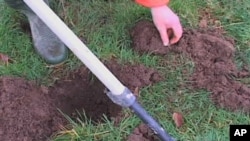Roger Mintey struck it rich. These are a few of the 6,000 gold and silver coins he found while metal detecting in southeast England some years back.
"These are all pure gold," he said.
Mintey made about a quarter of a million dollars from the find. The coins date from the 13th to 15th centuries, and offer insight about that period.
"You can see on this coin, a ship and the king. Symbolic to remember everyone, even our enemies, that England was a great power," he added.
Mintey found the coins on a construction site. There's a house there now. He knows the find was pretty much pure luck.
"I'll never find something like this again, but that doesn't put me off detecting because I'm not in it for fame, I'm not in it for the money, I'm in it for the interest," he explained.
On this day, he sweeps the detector over the soil and hopes for a beep. When there is one, he digs. This time though, it's scrap metal.
Metal detecting is popular in Britain, with clubs across the country. And others have made big finds.
At London's British Museum, the Staffordshire Hoard is one of the biggest detector finds and the largest single collection of Anglo-Saxon artifacts ever found. The 7th century artifacts were discovered last year in Staffordshire, central England, by a detectorist.
Michael Lewis is the museum's deputy director of portable antiquities and treasure.
"Lots of gold and silver, bits and bobs, mainly from war gear like sword fittings and things like that, so it's an amazing find," he noted.
Experts say when the objects are cleaned and analyzed, they could change the entire understanding of the period.
Terry Herbert found the hoard. He will share the $5.25 million reward with the landowner.
"It's been more fun than winning the lottery," said Herbert. "Stuff like this is still in the ground. Is there anything better than this to be found?"
Archaeologists were called in to recover the treasure, after Herbert declared the find to local authorities.
The Brtitish Museum's Lewis says many archaeological finds are identified by detectorists and there's good collaboration between them and historians.
"We've moved away from a period we used to have where there was a lot of conflict and confrontation between detector users and archaeologists to a period where we're trying to work together and use the skills that detectorists have in an archaeological context," said Lewis.
Back in the countryside, Roger Mintey still hasn't found new treasure.
"Not the roman coin I was hoping for. Not even the Victorian silver coin," said Mintey.
Mintey says about 60 percent of what he finds is junk. The rest may be salvageable metal or modern coins, but that's not why he's here.
"I do it for the excitement, because you never know what that next beep will be," he added.
The next beep could be treasure. But even though he says big finds are once in a lifetime, he still keeps on looking.
British Sleuths Find Buried Treasure

Metal detecting is a popular hobby in Britain, with clubs across the country. In the past year, detectorists, as they are called in Britain, have made big finds, valuable both in financial and archaeological terms.



